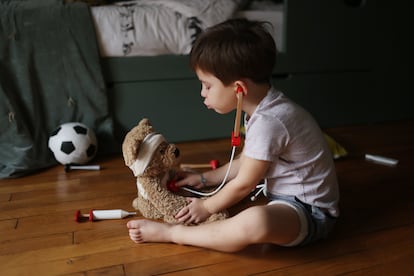The absent parent syndrome and its impact on child development
A lack of affection can lead children to constantly search for approval, as well as make them insecure and rebellious. The key to avoid this is to spend quality time with them

The absent parent syndrome refers to parents who are not present during their children’s childhood, which has consequences on the child’s development. This situation may be due to several causes. “Long working hours, a job transfer, a separation, a complicated divorce or death. However, the absence of the father or mother is not always due to [physical] reasons; it is often an emotional absence,” describes Iosune Mendia, a child and adolescent psychologist. This type of situation influences the child in different ways. “The lack of affection has a direct impact on their emotional, physical and mental development, and in all cases there is a feeling of abandonment,” adds the expert.
In addition to not being physically present, emotionally absent parents are characterized by other behaviors. “They do not perform any function in the family environment [and instead] delegate authority and the application of limits, as well as care and emotional support, to their partner. On occasions, they disassociate themselves from parenting or support and do not establish emotional ties,” the specialist points out.
Parents who are not present in their children’s lives during childhood leave a trace of affective deficiency. “It translates into feelings of discomfort, loneliness and emptiness, all of which stem from that unmet need for love, as well as a constant search for approval to fill that void,” explains Mendia. The lack of parental role models also influences aspects of the child’s personality in terms of how he or she relates to the world around him or her. “These are children who are more insecure. They have low self-esteem and difficulties in managing their emotions and affectivity. Throughout their lives, sadness, depression, lack of interest, poor academic performance, lack of motivation or passivity tend to appear,” she says. In addition, the psychologist points out that there can be insecurity, which can be masked and shown with overconfidence, arrogance, aggressiveness or rebelliousness as a way of covering up painful feelings.
How to avoid being an absent parent
Children need to spend quality time with their parents. “They need physical contact through gestures of affection” and be included in activities “such as cooking because affective learning cannot be achieved at a distance,” says Azucena Díez, a specialist in pediatrics and child and adolescent psychiatry.
Also a member of the board of directors of the Society of Child Psychiatry of the Spanish Association of Pediatrics, Díez explains that when circumstances come up that prevent parents from spending time with their children, it is advisable to compensate for the lesser amount of time with quality time. During quality time, parents should “pay full attention” to their kids “and avoid trying to do several different things at the same time, as this can generate frustration and guilt in the parents.” This pediatrician and psychiatrist provides several guidelines for cases in which parents have to be absent for reasons beyond their control, such as work or caring for other people. Díez points out four tips:
- Convey to the children that this is a temporary situation and not something permanent.
- Compensate for the absence of one parent with the presence of the other and try to take turns between the two, because the absence of both parents is more complicated for the children.
- Convey a message of unconditional affection, explaining the situation to them with messages such as: “I love you very much and I would love to be with you.”
- Dedicate your full attention to them when you are with them. It is not necessary to make big plans, because it is not about making up for absences. Children are often looking for their parents to be with them at home quietly.
Do children with absent parents end up becoming absent parents themselves?
It is typical for children with absent parents to repeat the same behaviors once they are adults and have their own children. “They will probably be people who, in their need to find affection and a mother or father figure, will establish toxic relationships. They will be afraid of abandonment, so they will tend to seek emotionally dependent relationships based on hostility and mistrust,” says Mendia.
These future parents tend to engage in various behaviors with their children. For example, according to Mendia, they run the risk of having difficulties in establishing healthy and strong bonds with their kids, becoming absentee fathers and mothers or going to the other extreme and becoming overprotective.
Sign up for our weekly newsletter to get more English-language news coverage from EL PAÍS USA Edition
Tu suscripción se está usando en otro dispositivo
¿Quieres añadir otro usuario a tu suscripción?
Si continúas leyendo en este dispositivo, no se podrá leer en el otro.
FlechaTu suscripción se está usando en otro dispositivo y solo puedes acceder a EL PAÍS desde un dispositivo a la vez.
Si quieres compartir tu cuenta, cambia tu suscripción a la modalidad Premium, así podrás añadir otro usuario. Cada uno accederá con su propia cuenta de email, lo que os permitirá personalizar vuestra experiencia en EL PAÍS.
¿Tienes una suscripción de empresa? Accede aquí para contratar más cuentas.
En el caso de no saber quién está usando tu cuenta, te recomendamos cambiar tu contraseña aquí.
Si decides continuar compartiendo tu cuenta, este mensaje se mostrará en tu dispositivo y en el de la otra persona que está usando tu cuenta de forma indefinida, afectando a tu experiencia de lectura. Puedes consultar aquí los términos y condiciones de la suscripción digital.









































